#policy history
Note
On the subject of UBI, I always ask about the MCU UBI: Tony is a billionaire who lives a life of luxury, Bruce has a serious chronic illness that requires expensive medical care, and Trevor just wants to sit round all day drinking and doing drugs. I take the UBI guys more seriously if they can say what each man gets from a UBI.
That's a somewhat odd choice of characters to think about how a UBI would function in the MCU.
So yes, Tony Stark would get a UBI. Relative to his private income, his UBI check would be totally inconsequential - and given the level of taxation needed to support a UBI, it's pretty much guaranteed that Tony would be paying far more in taxes than he would be getting back in UBI payments.
This is not an accident or a mistake or a flaw in the system; this is how a healthy social policy should function. When Social Security was established in 1936, FDR made a big deal of the fact that even John D. Rockefeller would get a Social Security check - because it hammered home the point that everyone contributes, and everyone benefits. Reciprocal solidarity would short-circuit the divisive politics of distribution and redistribution and cement a permanent majority coalition in support of a universal welfare state.

Bruce Banner would also get a UBI check. Now, his financial situation is a little unclear - originally, Banner was a top research scientist at Culver University with U.S military contracts, so he would probably have been in the top 10% of incomes (affluent but not wealthy). After his transformation into the Hulk, however, Bruce was a wanted fugitive with no way of earning income.
After that, Bruce was an Avenger - and this is where things get odd. As established in Falcon and the Winter Soldier, Avengers in the MCU don't get a salary: Tony gave them free housing and paid their Avengers-related expenses, but Sam Wilson notably relied on his veteran's pension and government contracts for his living (thus why his banker could justify turning him down for a small business loan rather than admitting to structural racial discrimination) and Steve Rogers even with his veteran's benefits, Social Security, and SHIELD salary couldn't afford a place in Brooklyn. This means that, while Bruce doesn't need to worry about money for his research and can save on rent, he does actually need the UBI for everything else.
This is very different from in the comics, where Avengers get quite decent salaries:

$4k a month in 1983 dollars works out to around $150k a year (on top of free housing at the Avengers Mansion), putting them solidly in the top 13% of U.S personal incomes.
As for Trevor Slattery, I feel like your description is unfairly characterizing a working actor. Slattery was not a major success in Hollywood - hence why he took Aldrich Killian up on his job offer and became part of a criminal conspiracy - and he does have some serious substance abuse issues, but what he does in his private life is his own business. Hell, even when he was abducted by the Ten Rings, he kept working as an actor. That being said, Trevor is going to have a hard time getting UBI, both because he's a wanted fugitive and convicted felon (which would end his eligibility in the U.S) and because he's now living in a rural village in another dimension.
68 notes
·
View notes
Text
Reagan’s position on voluntarism was willfully equivocal, variously seeking to exploit and disable the energies of a nonprofit sector that had first become a target of government funding under the Great Society Agenda. Even while he endlessly exhorted nonprofits to pick up the slack from failing public services then, Reagan did everything in his power to undercut the nonprofit infrastructure that had grown out of, and beyond, the Great Society community action programs. With their proximity to civil rights movement and the New Left, these evidently were not the kinds of voluntary initiative that Reagan wished to foster. Reflecting on the legacy of Reagan’s first few years in government, Lester Salamon calculates that Reagan ended up cutting ‘the equivalent of $115 billion in real terms’ to the nonprofit sector between 1982 and 1985. The Omnibus Budget and Reconciliation Act of 1981 led to huge cuts for grant-in-aid programs to state and local government, the first such cuts in almost a quarter of a century, and transformed a wide variety of categorical grants (that is, grants with budgets allocated to fixed programs) into block grants that gave states less money but more discretion in how to spend it. These reforms eviscerated the smaller, more militant, nonprofits that had benefitted from Great Society funding largesse and had a particularly devastating effect on healthcare services for the poor. During Reagan’s first term, it is estimated that cuts to healthcare block grants averaged from 20 to 35 percent nationwide; grants-in-aid to state and local governments for preventative health programs declined by 22 percent; for health resources by 42 percent; for health services by 22 percent; for alcohol, drug abuse, and mental health by 34 percent; and for Medicaid by 7 percent.
At stake here was something more than a deference to limited government: Reagan was profligate in other areas of federal spending and indifferent to the soaring budget deficit, squandering billions on the military and tax concessions, much to the dismay of some of his closest advisors. More than a testament to fiscal conservatism, Reagan’s cuts to the nonprofit sector were motivated, foremost, by a political animus against the legacy of Great Society welfare programs. Upon entering office, Reagan quickly moved to shut down the Community Service Administration (which had begun life as the Great Society’s Office of Economic Opportunity, the body responsible for funding Community Action Programs) and replaced it with a new voluntary sector agency named ACTION. He then appointed a ‘particularly ardent conservative’ as head of the agency, who made a special effort to stop funds going to left-leaning activist organizations. According to new rules issues by ACTION, organizations could not use federal funds to engage in the ill-defined activity of ‘political advocacy’ and would have to isolate funds that they used toward that purpose if they received as little as 5 percent of their operating budget from the government. This stipulation was evidently aimed at the kind of public interest litigation that had grown out of and alongside the radical welfare activism of the 1960s and ‘70s – in particular, the various Supreme Court challenges that had undermined the power of state welfare agencies to police morality. It was designed to stifle precisely the kinds of public policy activism that AIDS service organizations would engage in, despite all the odds, throughout he 1980s.
Melinda Cooper, Family Values: Between Neoliberalism and the New Social Conservatism
#melinda cooper#ronald reagan#the great society#history#policy history#aids#welfare#united states#reaganism#neoliberalism#conservatism
9 notes
·
View notes
Text
i am reading this paper about all the bombs and missiles and other weapons the USA govt gives to Israel, because I am trying to understand why we are doing this, and it makes me sick at heart—all this money and advanced technology, all poured into blowing human beings up. "When all you have is a hammer, everything looks like a nail"—how could billions and billions of dollars worth of the tools of violence NOT result in violence?
I don't feel any closer to understanding what is happening in terms of how it connects to concrete reasons in people's heads. The connection between giving a government billions of dollars in weapons and that government solving all of its problems with extreme violence seems very clear though.
USA policies toward the rest of the world keep being like "Yeah, we want to promote peace, but, like, this group of people is SO uniquely threatening and unreceptive to normal propositions of peace that we HAVE to wage endless war against them and commit atrocities." First it was "Japan will never surrender so we HAVE to nuke civilians," then it was Communists, then it was Terrorists, but it's the same thing.
I don't remember the world before 9/11, but I can look at and listen to art and music from before 9/11, and it seems like something terrible happened in USA culture, where once there was a strong "anti-war" sentiment and understanding of what war does to people, but within my lifetime, it's like no one has the audacity to imagine a world where endless war isn't "necessary." In high school my class mates were talking about seeing videos online of ISIS sawing peoples heads off and that was basically all I knew about "what was happening in the Middle East."
Does anybody even think about why peace signs are part of the 60's "aesthetic?"
I don't have any conclusion here. Have we lost the power to imagine anything different?
3K notes
·
View notes
Text
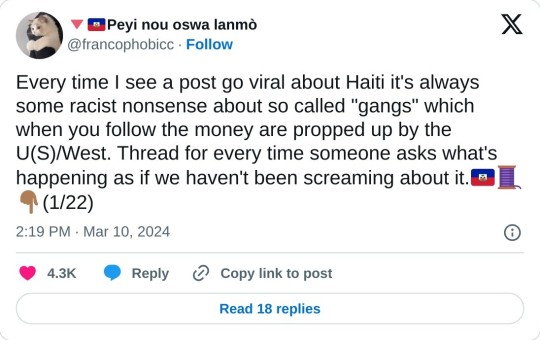
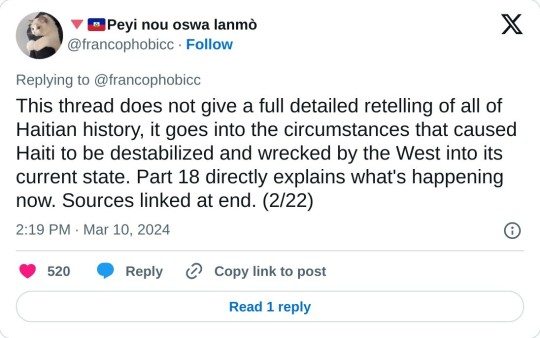
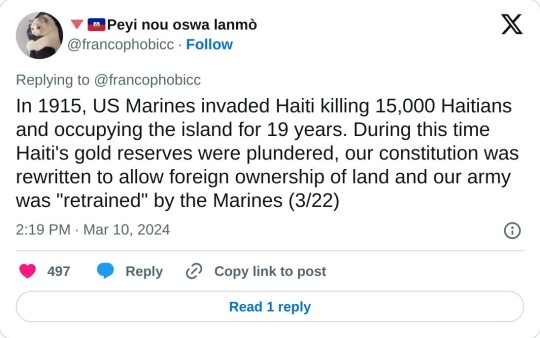
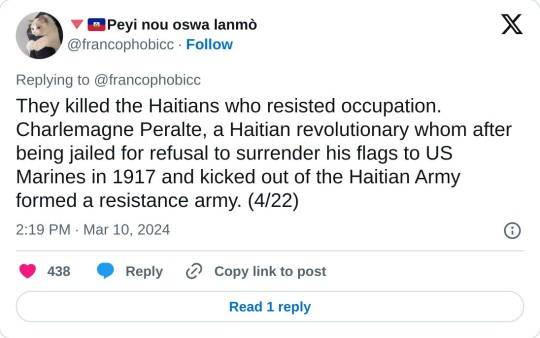
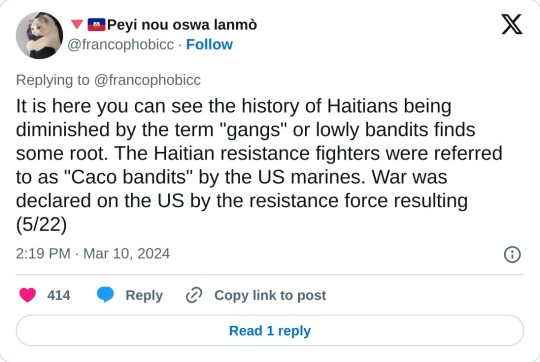
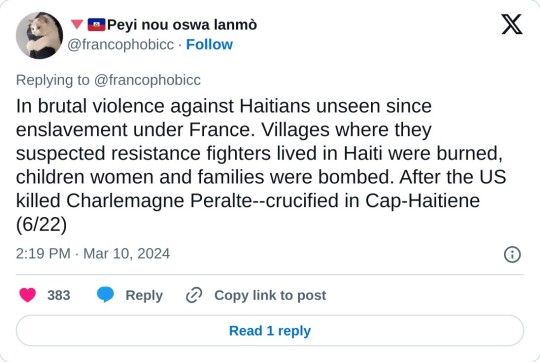
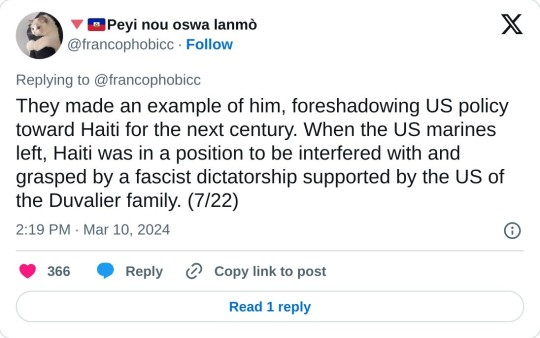
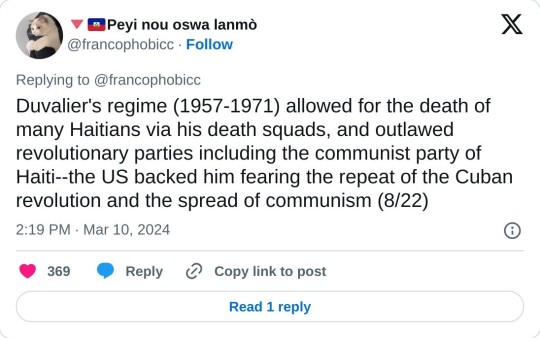

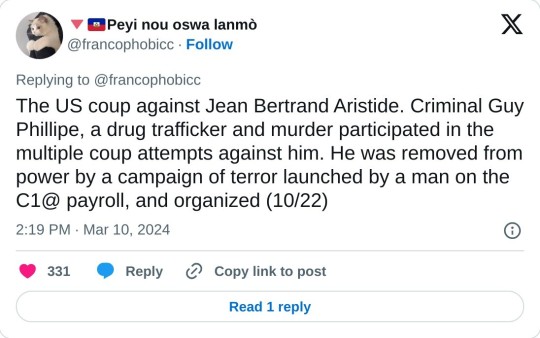

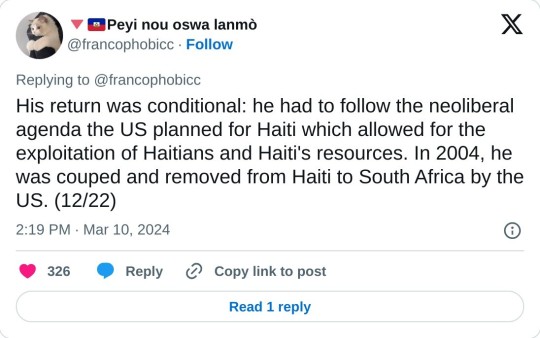
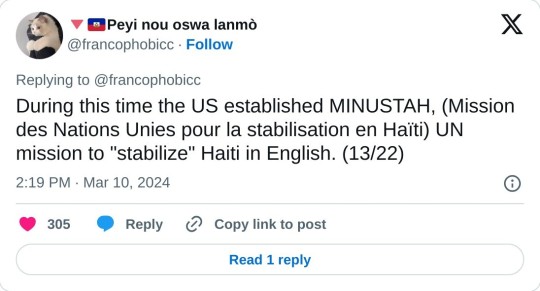

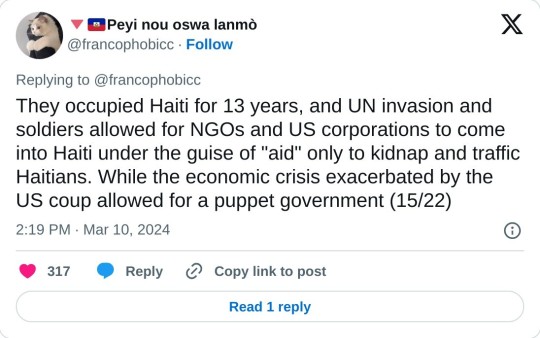
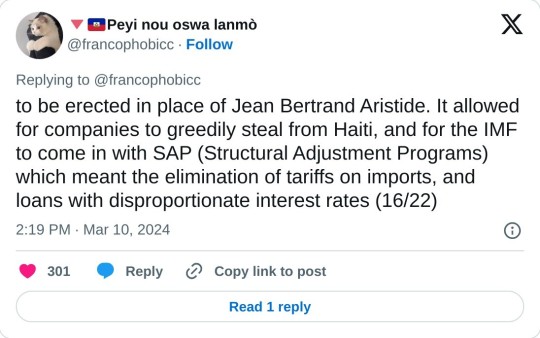
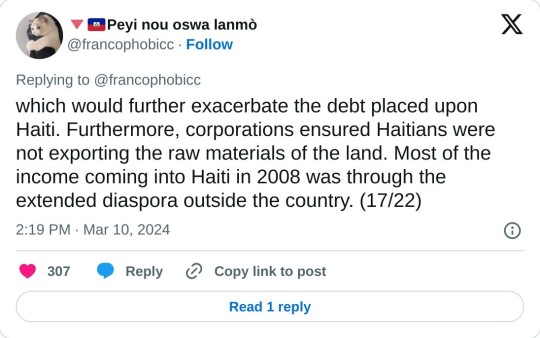
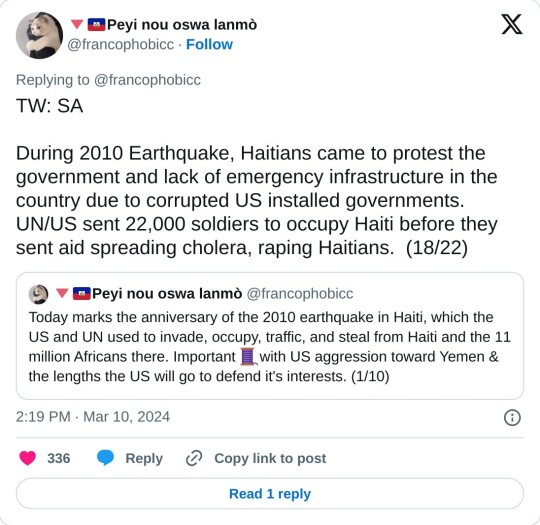


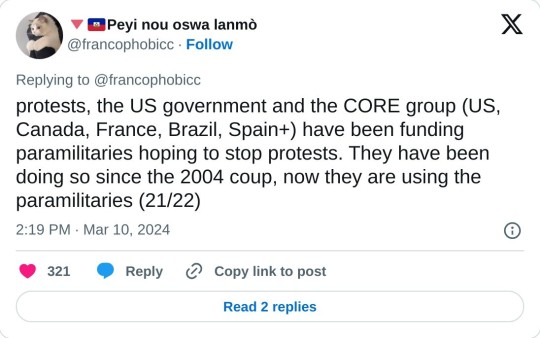
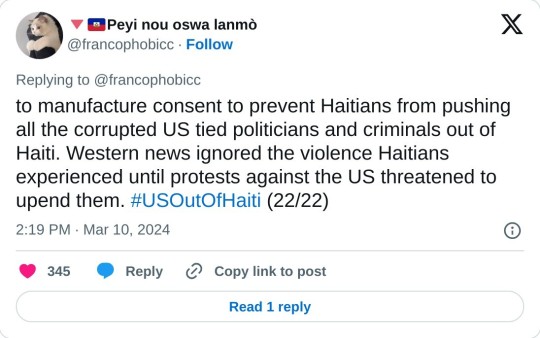
Resources OP provides:
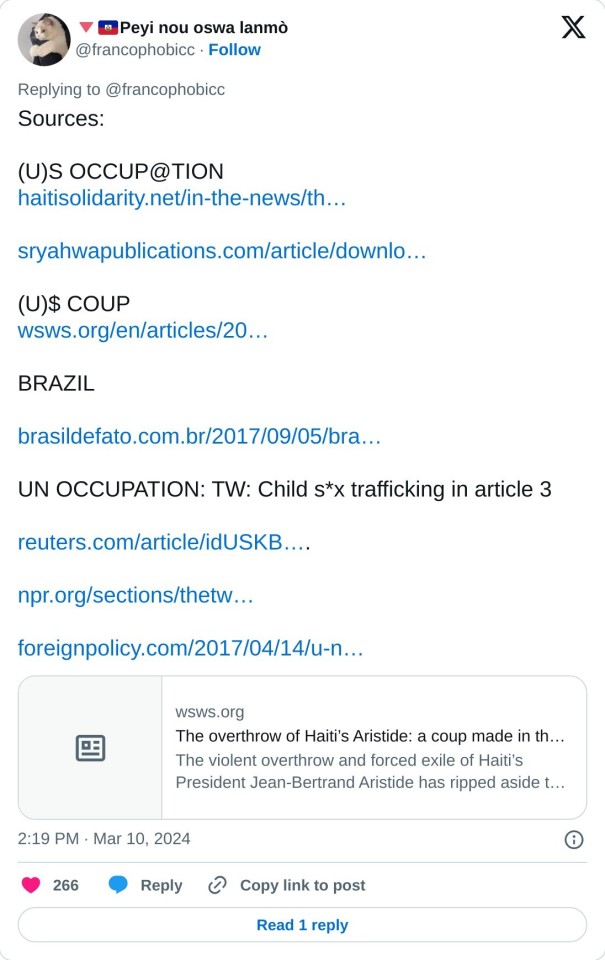
#feminist#social justice#current events#free haiti#haiti#haitian revolution#united states#france#brazil#history#united nations#us imperialism#western imperialism#us politics#us foreign policy#tw sa mention#USOutOfHaiti#us history#education
921 notes
·
View notes
Text
It’s so funny when liberals lecture communists about not knowing how anything works, that we need to grow up and face the real world etc, while publicly demonstrating that their political imagination is so deeply impoverished that they genuinely believe the only thing the leader of the most powerful country on the planet in all of human history can do is block a slightly more fascist guy from taking his place every four years
#one of the reasons I am a communist is because I believe in the wondrous power of a state in the hands of the working class! like it is#legitimately moving to learn about the transformative ways socialists use a proletarian state to direct a socialist society#what boer calls god-building and newton calls demiurgical. the state has a universe-building potential to it#and even setting aside socialist history the idea that the president of the US is unable to affect any local or state policy within his own#borders or foreign policy without is so baldly laughable it shouldn’t even be worth considering#except for the fact that so many people profess to genuinely believe that#whether they actually do is another story but christ alive man.
925 notes
·
View notes
Text
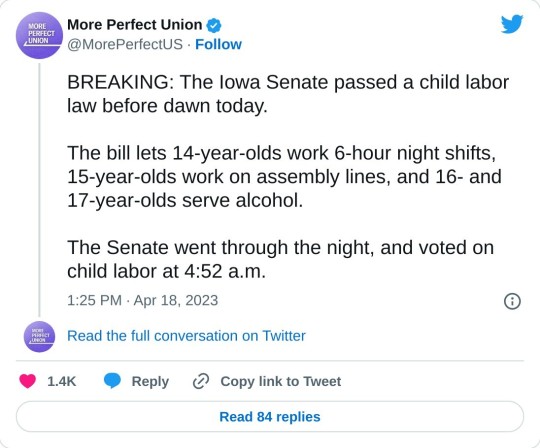
#us politics#news#twitter#tweet#republicans#conservatives#gop#gop policy#gop platform#republican family values#more perfect union#iowa#iowa senate#child labor#child labor laws#worker's rights#working class#working class history#working class solidarity#night shifts#assembly lines#alcohol#alcohol servers#alcohol sellers#bartending#2023
954 notes
·
View notes
Text
Researchers say newly discovered archival records reveal an important connection between Ontario First Nations and Irish famine victims.
The Irish Potato Famine was a period of starvation and disease in Ireland, and one of the most traumatic events in modern Irish history. Year after year, the country's potato crop failed. By the time the worst was over, one million people had died of disease and starvation. Survivors were forced to emigrate. In the summer of 1847, Toronto gave refuge to 38,000 Irish famine victims — at a time when Toronto's population was only 20,000.
The part of this history that is virtually unknown is the contribution to the relief fund from Indigenous communities in Canada.
"At least 15 bands answered the call and requested that donations be deducted from their government annuities, added to the fund, and then sent to 'our suffering fellow subjects and Christian brethren in Ireland and Scotland,'' according to Mark McGowan's research. McGowan is a professor of history at the University of Toronto and has spent time going through the archival documents. [...]
Continue Reading.
Tagging: @politicsofcanada
#cdnpoli#First Nations#Foreign Policy#Ireland#Indigenous politics#Indigenous history#Ontario#Mohawks#Haudenosaunee#Chippewa#Delaware#Wyandotte#Mississauga#Saugeen#Lake Huron Ojibwa#Moravian Ojibwa
210 notes
·
View notes
Text
A short reminder that Russia is imperialist, has been imperialist for a long time, and there's no way around that fact.
Sections of the Western left have developed a narrative according to which Russia has been gradually surrounded by NATO and that supposedly "provoked" Putin. It's increasingly difficult to sustain the notion that Russia is simply "defending itself" after 24 February 2022, but the thing is - the invasion did not come out of the blue. One needs a different narrative to understand what Russia actually is: an aggressive imperialist power alongside other imperialisms.
So, a different narrative:
- 1994: Russia, with US support, acquires Ukrainian nuclear arsenal in exchange for the assurances to respect Ukraine's territorial integrity
- 1997: Russia acquires the Sevastopol naval base and almost all of the ships (82%, to be exact)... in exchange for the assurances to respect Ukraine's territorial integrity!
- 2004: Russia meddles in Ukrainian presidential elections, fighting hard to force an undemocratic fraudulent outcome, but fails
- Mid-to-late 2000s: As punishment for Ukraine electing Yushchenko, Russia uses energy blackmail, a form of economic coercion not very different from the IMF and World Bank lending and conditionality
- 2008: NATO refuses to adopt a roadmap towards Ukraine's membership and in effect postpones the decision indefinitely. Ukraine's security is in no way guaranteed, while Russia has already demonstrated the propensity to use coercion to force Ukraine to do its bidding
- 2009: Dmitry Medvedev, then president, writes to Yushchenko that "Russia does not pose and cannot pose any kind of threat to Ukraine", so seeking NATO membership is stupid. Yea, sure
- 2014: Russia, which "does not pose and cannot pose a threat to Ukraine"... annexes Crimea. Really, Dima?? I thought you were for real??
Of course, by annexing Crimea Russia not only makes all the previous statements that it "can never pose a threat to Ukraine" a ridiculous lie, but also breaks the 1994 memorandum and 1997 treaty. "We are the Kremlin. Our word is worth nothing"
- Crimea's annexation provokes armed separatism in Donbas that Russia supports and coordinates, including direct military command and control, and then completely subordinates Donbas "authorities", in effect occupying the region
- Ukraine's still not in NATO, its security is still in no way guaranteed, and the supplies of US weapons only begin in 2018. They are kept to a minimum... out of fear of provoking Russia!
- Nevertheless, on 24 February 2022 Russia launches a full-scale invasion to establish 100% control over all of Ukraine in one way or another. There is literally no military development on the ground that could have provoked the invasion. On Russia's part, it's a war of choice in exactly the same way the invasion of Iraq was a war of choice for the US in 2003.
Now, this is only the general outline. One should add Russia's drowning of Ukraine with spies and agents of influence, money to corrupt Ukrainian politicians and massive acquisition of Ukrainian assets to impose economic and political dependency.
These are well-known facts, but so many on the left refuse to see the story behind them. It's a story of decades of imperialist aggression, culminating in a war that cost 150,000 lives in 2022 alone. Any discussion of left-wing internationalism should begin with recognizing the reality of what Russia is and what it did.
#ukraine war#ukraine#imperialism#left#russian imperialism#russian ukrainian war#russia#policy#war#nato#russian chauvinism#anti-imperialism#history
815 notes
·
View notes
Text

Today is a good day to remember Salvador Allende, the democratically-elected President of Chile, who died in September 1973. Allende most likely shot himself in the La Moneda Presidential Palace in Santiago when he could no longer fight off the forces of General Augusto Pinochet as they executed a violent coup heavily supported by the United States and Henry Kissinger. Pinochet then ruled Chile as an American-supported "anti-communist" military dictator for nearly two decades in which tens of thousands of Chileans were killed, jailed, or simply disappeared.
Allende, a socialist, was popularly elected as Chile's President with promises to strengthen democracy in Latin America and institute significant economic, education, and health reforms in order to dramatically improve the social welfare of the Chilean people. Some American leaders, like Henry Kissinger, saw him as a potential threat -- a South American version of Fidel Castro -- and the CIA begin laying the groundwork for eventual regime change.
The biggest problem with Allende, in Kissinger's mind, was the very fact that he was freely and democratically elected. In a memo to President Nixon that is still somewhat shocking to read, Kissinger wrote that "Allende was elected legally...He has legitimacy in the eyes of Chileans and most of the world; there is nothing we can do to deny him that legitimacy or claim he does not have it." Kissinger then reminds Nixon that "We are strongly on record in support of self-determination and respect for free election; you are firmly on record for non-intervention in the internal affairs of this hemisphere and of accepting nations 'as they are.'" Then he spends several pages outlining ways in which to undermine, delegitimize, and potentially eliminate "the Problem." After all, as Kissinger wrote shortly before Allende was elected, "I don't see why we need to stand by and watch a country go communist due to the irresponsibility of its people. The issues are much too important for the Chilean voters to be left to decide for themselves."

#History#Salvador Allende#Chile#Latin America#South America#Allende#Augusto Pinochet#Henry Kissinger#Richard Nixon#President Nixon#Nixon Administration#Foreign Policy#CIA#Regime Change#Coups#Kissinger#Death of Henry Kissinger#Politics
247 notes
·
View notes
Text
"Why are Irish people so quick to defend the Palestinians and to call out Israel?"
This is a list of what the British authorities were allowed to do to the local Irish population in Northern Ireland:

This Act was only repealed in the 1970s.
Violence, oppression, and discrimination against the Irish is not ancient history. Many Irish people are still feeling the effects today. Northern Ireland has one of the highest rates of PTSD in the world. It has some of the worst mental health statistics in general. It's still plagued by political dysfunction, which is a direct result of Britain's colonial activity in Ireland.
So why do the Irish support Palestine?
It's because many of us have lived through very similar things to what they are going through.
#and if you go back further in Ireland's history there are even more unfortunate similarities#the genocide by Cromwell and arguably the Great Famine was a genocide or at least heavily exacerbated by British policy in Ireland#the Ulster plantations which were very similar to the settler colonialism happening in the West Bank & which ultimately led to the Troubles#these things are heavily present in Irish folk memory#colonialism has patterns and colonised people can easily recognise it and see it for what it is#ireland stands with palestine#ireland#palestine#israel#gaza
248 notes
·
View notes
Note
Any thoughts/opinions on the idea of Universal Basic Income?

So I come out of MMT-adjacent circles that tend to focus on Job Guarantees over Universal Basic Income(s).
There is a certain amount of rivalry and bad blood between these two camps, as they see their projects as competing for the same policy "space" as solutions to poverty and unemployment. For example, back when I was on twitter I got into quite a few arguments with Matt Bruenig, who is a UBI advocate and quite hostile to Job Guarantees, and I was not the only MMTer/job guarantee advocate who mixed it up with Bruening and his supporters.
For my own part, I am not opposed to incomes policies in general. Certainly, I think we saw from COVID-era initiatives around Unemployment Insurance and the Child Tax Credit that incomes policies can be tremendously effective in stabilizing consumer demand, preventing eviction and homelessness, and especially in cutting poverty rates. Likewise, I think there is now pretty solid empirical evidence that the concerns about employment effects that were the bane of UBIs and Negative Income Tax (NIT) proposals from the 1970s onwards are baseless.
That being said, I think there are other critiques of UBI from the left that were raised by Hyman Minsky in the late 1960s and 1970s that (instead of focusing on employment effects and the ideological question of "dependency") center on the fiscal capacity of the state, the problem of inflation, and the inability of UBIs to solve the problem of lost labor-time, which remain open questions.
This is why I am skeptical of the more Georgist approach to UBI as panacea. To my mind, incomes policies are a partial solution to some socioeconomic problems that have some side effects; they need to be buttressed by complementary policies (including job guarantees) that can do things UBIs can't, while also dealing with UBI's side effects. In some sense, it shouldn't be very surprising that a belt-and-braces strategy is best, because that was the intended vision for a comprehensive New Deal order proposed by the National Resources Planning Board in 1942.
#public policy#economic policy#social policy#universal basic income#negative income tax#job guarantee#job guarantees#my day job#mmt#political economy#ubi#people must live by work#policy history
80 notes
·
View notes
Text






Carlos Reyes Mounting TK Strand: A Study
#I think this is important not just for science but for maths geography art theatre physical education history and theology#Shoulders that could change government policy am I right lads?#carlos reyes#TK Strand#Tarlos#I'm not procrastinating YOU ARE
277 notes
·
View notes
Text


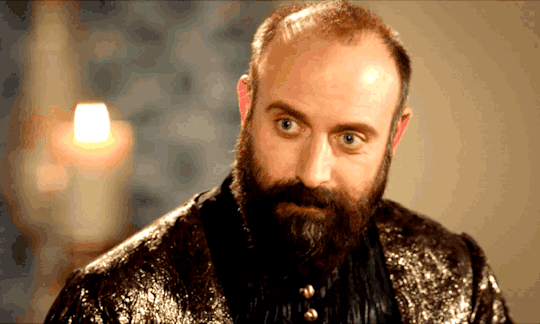
Some thought Roxelana used seductive powers, even potions, to induce the love Suleyman appeared to bear her. They called her witch. — Leslie Peirce, Empress of the East: How a European Slave Girl Became Queen of the Ottoman Empire
#Muhteşem Yüzyıl#Magnificent Century#mcedit#Muhtesem Yuzyil#perioddramaedit#weloveperioddrama#Hurrem Sultan#The Concubine Hurrem#Blind Fury#It Is the Policy and Nothing Personal#ottoman history#history#Sultan Suleiman#Awkward-Sultana#period drama#historical drama#turkish history
64 notes
·
View notes
Text

and each one of these is public policy entered in the records
#politics#racism#black history month#antiblackness#us politics#black history#public policy#social justice#social issues#ion know y they turned off reblogs for this post but its a banger
58 notes
·
View notes
Text
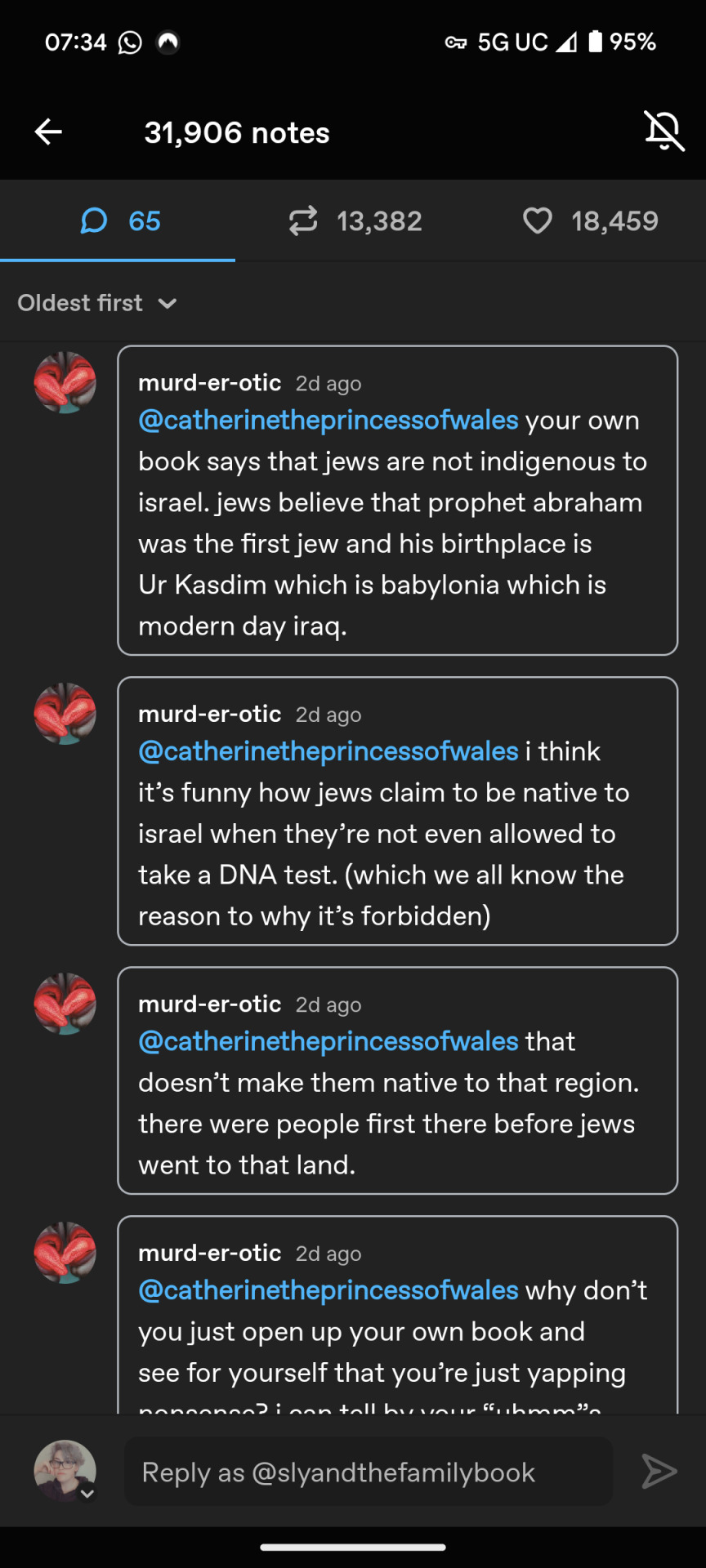
me when I'm the dumbest motherfucker alive
#atlas entry#well let's look at “our own book” and see what it says#“the entire land of Canaan and Transjordan belongs to the Jews”?? wuh-oh that's not a good foundation on which to build a secular state#idek where to start with this one man. the conflation of native and indigenous? not knowing what ethnogenesis is?#lying about Israel's policies wrt DNA tests? calling אברהם אבינו A prophet?#I think the best part about that is saying Jews can't be indigenous bc Avraham was “the first Jew” but the word Jew comes from Judea#which is not where he was from. there's a reason we call him Ivri. wow almost like Jews know more about our history than random goyim
65 notes
·
View notes
Text

With every passing day, it is harder and harder to argue that--at the very least--the end goal is not the total ethnic cleansing of Gaza.
#politics#us politics#progressive#america#war#foreign policy#history#gazaunderattack#gaza genocide#gaza#gaza strip#free gaza#free palestine#israel#idf#palestine#middle east#rafah#ethnic cleansing#benjamin netanyahu#gaza city#collective punishment#evacuation#displacement
52 notes
·
View notes